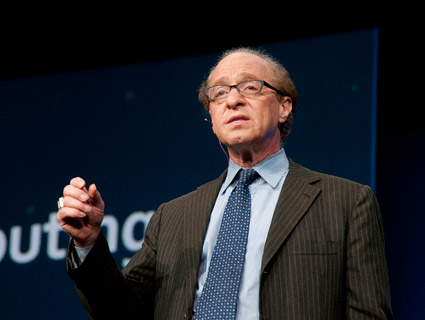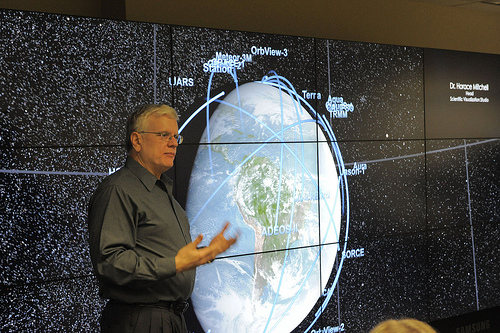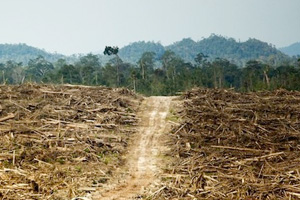
<a href="http://www.flickr.com/photos/59781591@N00/443489003">Frank Peters</a>/Flickr
This post first appeared on the Guardian website.
Last week, I received an email from the Adam Smith Institute alerting me to a new briefing paper it is publishing this week. The ASI must have known that the title would catch my eye—and indeed it did: “Dispelling the myths: Palm oil and the environmental lobby.”
The ASI bills itself as the “one of the world’s leading thinktanks” and says that its aim is to “promote free markets, limited government, and an open society”. It is known for being one of the chief policy architects of privatisation and the poll tax during the Thatcher era.
With this kind of pedigree, I was intrigued to see what the ASI’s views on palm oil might be. I already had an inkling what its views on the “environmental lobby” might be (clue: not positive), but I wasn’t aware that it had ever passed judgment on the merits of south-east Asia’s highly controversial palm oil plantations.
But something else intrigued me: the timing of the paper. It was only a few weeks since I wrote about Tory MEP Roger Helmer, who had been flown out to Malaysia by the palm oil industry to give a speech in which he advised it how it could better lobby Brussels. Earlier this month the world’s second largest palm oil producer, Golden Agri-Resources, signed an agreement with conservation group the Forest Trust. And just last week a major Malaysian palm oil producer approached the Guardian with an offer to take a journalist on a tour of one of its plantations—the offer was declined. But did all this signal that the palm oil industry in Malaysia had launched a new offensive to improve its reputation in Europe, and in particular was it trying to use free-market, libertarian advocates such as the ASI and Helmer to do its bidding?
The ASI paper itself (PDF) contains few surprises. To support its case, the paper largely draws on three sources: the Malaysian Timber Council, the Malaysian Palm Oil Council and the Taxpayers’ Alliance. In doing so, it attacks the “green lobby” on fairly predictable ideological lines, such as believing that “capitalism is responsible for a widespread collapse in habitat”. It adds that palm oil plantations act as useful carbon sinks—”a fact ignored entirely by the green lobby”—and that “environmentalists’ fundamental opposition to agriculture development” is a “key contributor” to the growing worldwide food crisis. The ASI paper is also critical of green NGOs receiving funds from the EU, as well as their claim that Malaysia’s plantations in particular are a threat to the orang-utan. In conclusion, it states:
It’s time we questioned many of the claims and assertions made by the green lobby. The cultivation of palm oil is perhaps one of the best examples of such current controversies. It turns out that under closer analysis some of the key criticisms of both the industry and countries such as Malaysia are flawed.
Adopting high-profile endangered animals is a cynical device to win more support and funding for green NGOs such as Friends of the Earth and WWF. We should take the Malaysian example as a sign to reassess many assumptions about the environmental impact of industry in the developing world, and remember that our well-meaning sentimentality can have profoundly negative consequences for people trying to work their way out of poverty.
Given its supportive stance, one immediate and obvious question to ask is did the palm oil industry commission the ASI to write this briefing paper, or in anyway influence it? I put just this question to the thinktank. It replied:
The ASI commissioned the briefing paper as we thought it was an interesting topic that hadn’t been explored and did not receive any funding from any external groups.
Fair enough. No obvious wiggle room in that answer. I also noticed that the paper’s author, and the ASI chairman, Keith Boyfield, runs a consultancy called Keith Boyfield Associates which “helps clients to improve their international competitiveness”. Its website lists some well-known clients including BNFL, JP Morgan and the Society of Motor Manufacturers & Traders. Was it possible the consultancy’s clients include a representative of the palm oil industry? I called Boyfield and asked how he’d come to write the paper. He said:
Eamonn Butler, the director of the Adam Smith Institute, and myself attended a lunchtime seminar organised by the Institute of Economic Affairs, where I’m a fellow, about this whole controversy and debate about palm oils. They had some speakers there including the guy who is the minister of commodities for the Malaysian government. I found myself sat next to his private secretary and he got me interested. There were two people who asked questions after the seminar, Eamonn and myself. I asked: ‘Why is it that you’ve been making such a poor hand at trying to get your point of view across?’
I’d been reading into this subject and seen things hadn’t worked out very well for Indonesia. But then I looked at the Malaysian case and I thought there was an argument to say that the palm oil plantations on the Malaysian peninsular when not damaging to the orang-utans because they were never there, but rather that they were in Borneo where it looked as if there had indeed been some erosion of rainforests. But from what I’ve read and heard, the Malaysian side have a relatively strong argument that they are looking after rainforests and that they’ve even been creating nature reserves. Sometimes you get the idea that Malaysians are rabidly cutting down rainforests. But I wanted to argue that there needs to be a little more balance about where the orang-utans actually live. If anyone has got counter arguments, that’s fine. I’d be very interested in seeing them.
Boyfield confirmed that his consultancy has “no links with the palm oil industry in anyway”. He added that he was on the Taxpayer’s Alliance advisory board and that “he was once in a restaurant in Brussels with Roger Helmer about three years ago”, but said he not had any dealings with him since and certainly not over this matter. He also said he would soon be writing up the paper as an article for the Wall Street Journal, where he has had pieces published in the past.
Unsurprisingly, the “green lobby” has also noticed the ASI paper and is keen to correct its, as one representative put it, “nonsense”. This is the response I received from Kenneth Richter, the Friends of the Earth‘s biofuel campaigner:
The link between rapid palm oil expansion and deforestation is clear and has been confirmed by leading scientists. In 2007, the United Nations concluded that today’s rapid growth in plantations is “one of the greatest threats to orang-utans and the forests on which they depend”, and now “the primary cause of permanent rainforest loss” in Malaysia and Indonesia.
Leading scientists have refuted the palm oil lobby’s claim that palm oil plantations are better carbon sinks than the forests or peat lands they are replacing.
It seems far-fetched and unfounded to blame the suspension of World Bank funding for palm oil corporations for the rise in food prices—in fact, research by the OECD and the World Bank has confirmed that growing crops for biofuels in place of food has been a contributing factor to this problem.
To avoid trashing rainforests, land grabbing, and increasing climate changing emissions, the UK government must urgently scrap targets for biofuels—the fastest growing demand for palm oil—as well as investing in greener cars and public transport.
The ASI paper aims much of its ire at WWF. This is what a WWF representative told me in response:
In light of our commitment to work with all actors, from local communities to producers, retailers and consumers, on an issue like palm oil, it is bizarre to claim that WWF has an “ideological opposition to economic development”. In fact, industry agrees with us, hence the willingness of businesses to work with us on developing sustainable certification standards.
Moreover, to suggest, as the authors of the report do, that we are opposed to agricultural development and that this opposition has contributed the growing worldwide food crisis and to riots in the streets of developing countries is entirely without basis.
In fact, we are keen to engage with progressive businesses of all kinds across a wide range of sectors, and we actively support sustainable growth in sectors like plantation agriculture—entirely contrary to the suggestions of the report.
Elsewhere it may be true, as the report says, that palm oil plantations can be a sink for carbon; but when they replace high-carbon habitats like wetlands, peat soils and forests then they will be a net emitter.
Indeed, Indonesia’s biggest oil palm grower, Golden Agri-Resources, have recently announced a ban on all further palm oil expansion onto land containing more than 35 tonnes per hectare of carbon—not something they would do unless they were convinced that in terms of climate change it does not make sense to replace forests and peat with palm oil.
In addition Sime Darby, one of Malaysia’s largest palm oil producers, has also now committed to produce carbon-neutral palm oil as well as to being fully RSPO certified—recognising that sustainability in palm oil is not only possible but also desirable.
On the matter of funding: environmental NGOs—including WWF—receive money for the expertise they provide to European institutions. Without this support, only corporate and industry interests would be represented at EU level. Many such NGOs are involved in working groups and “high level groups” that require time and resources and, unfortunately, we cannot provide this without financial help.
The grant we receive to operate in Brussels under the “Life+ regulation” was approved by both the European Parliament and the Council of Ministers; there is broad political consensus on the need of such funds. The funds are transparent and all recipients are known and accountable to their objectives.
WWF has almost 5 million members around the world, approximately 3 million of which are in Europe. These citizens want to see the WWF mission fulfilled at local, national and international level and our role in Brussels is crucial if we are to be successful.
We’ve always been entirely transparent about our sources of funding and receiving public funds for the work that we do is an entirely legitimate part of a healthy, democratic process.
Meanwhile, a Greenpeace spokesman said:
The Adam Smith Institute has exposed the ongoing effort to reposition the Malaysian palm oil industry as the good guys, free from peatland emissions or habitat destruction. Yet they can’t see that all-out reality denial is exactly what gives the industry a bad name whilst simultaneously harming the efforts of those companies that are working to tackle these problems.
Palm oil is a highly controversial commodity: that much we already knew. But this clear change of gear in the battle to win over public opinion suggests we will be hearing much more about this ubiquitous product in coming months.





